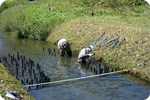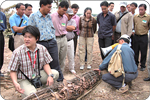Report
Internship: Internship: Report on an internship with IDEA Consultants, Inc
 |
 |
Figure 1. Environmental impact assessment (EIA) for large-scale projects |
Figure 2. Survey to investigate the relationship between riverbank topography and aquatic biodiversity |
Host: IDEA Consultants, Inc.
Raleigh:Yokohama City, Kanagawa
Duration:October 11 through November 11 2011
Key words: environmental consulting/assessment
Nobuaki Hanata ![]()
(1) Activities during the internship
From October 11 through November 11, I completed an internship with IDEA Consultants, Inc. in Yokohama City, Kanagawa, as part of the FOLENS program. IDEA is an environmental consultancy firm with the objective of providing high-quality consulting services (for infrastructure development, environmental conservation projects, etc., as shown in Figures 1 and 2). Their services range from project planning, surveying, analyses, and assessment to project design, maintenance, and management. The department to which I was assigned during my internship plays a coordinating role, managing all the above processes. My main responsibility was to prepare some technical reports for an environmental impact assessment (EIA) for the expansion of Haneda Airport, on topics such as management systems for hazardous chemical substances used by the airlines and other businesses operating out of the airport and for water pollution from agricultural chemicals. These reports were submitted to clients such as government ministries (the Ministry of the Environment; Ministry of Land, Infrastructure, Transport and Tourism; Ministry of Agriculture, Forestry and Fisheries, etc.) and some private Japanese companies. Much of my experience during the internship involved organizing documents or data at the office. However, these reports were usually drawn up on the basis of actual field investigations, such as surveys of the aquatic, atmospheric, soil, and terrestrial environment or measurements of various chemical substances in environmental samples; these activities were conducted by other departments. I also attended a weekly staff meeting where each department reported their ongoing activities. In this way, I could know what kind of work the firm was doing—for example, reconstruction contracts and measurement of radioactivity in the Tohoku region after the Fukushima nuclear disaster, and surveys related to “Rio+20,” which will be held in 2012—although I could not engage in all of these activities in practice. Moreover, people working in these departments sometimes kindly agreed to be interviewed and share their stories about their work, tips about their area of expertise, and attitudes toward environmental issues. These were all invaluable experiences for me.
 |
|
Figure 3. Laos—Technical cooperation on riverbank protection works |
|
(2) Experiences and achievements during the internship
The purpose of my internship was to learn what environmental consulting firms such as IDEA actually do and how these companies work as businesses that tackle environmental issues. To get an answer to this question, I decided to take an internship with IDEA; I felt that the experience would be a chance to get a clear picture of how to develop a future career in the environmental sector. Through my internship, I got an in-depth understanding of what kind of work the firm does by helping with a part of it. Environmental consultancy firms such as IDEA participate in the policymaking process by providing advice and recommendations based on their research findings. With the aid of such firms, the Japanese government and private companies can promote infrastructure development with a minimum impact on the environment. IDEA’s research also contributes greatly to the establishment of conservation law. I also learned that IDEA makes positive efforts to contribute to international cooperation by supporting partnership projects with other countries, especially developing countries, by extending their services in infrastructure development or environmental conservation, as seen in Figure 3.
From my work with IDEA, I have learned that Japan is a leader in the development of pollution-control technology and has the world’s strictest environmental quality standards; however, at the same time, Japan is one of the world’s major polluters. Thus, the Japanese people are collectively responsible for widespread destruction of the environment and should therefore become leaders in solving global environmental problems, as is widely advocated. At present, Asian and African countries are experiencing escalating demand for natural resources, food, and water, on top of soaring pollution and health problems, as well as increasing greenhouse gas emissions due to rapid economic expansion and population growth. There is an urgent need in these countries to develop sufficient knowledge and mastery of conservation techniques to ensure sustainable development. However, during the internship I also found that almost all of the international support to these countries is implemented in the form of official development assistance (ODA) projects. In recent years, private companies have come to play an increasing role in international cooperation, as evinced by the rise of public–private partnerships (PPPs) and the emergence of base-of-pyramid (BOP) business and of socially responsible business. However, financial contributions by private foundations or NGOs, even in activities funded by ODA, are still necessary at present. In other words, at least in Japan, businesses that provide environmental technology or knowledge to developing countries without depending on ODA are rare.
ODA is of course very important for developing countries. However, environmental technology transfer has its limitations if it is done only on the basis of ODA. I feel that private companies ought to provide technology or knowledge directly to developing countries under a business model, and also that by creating growth and employment, these business activities will be indispensable for the sustainable development of these countries. On the other hand, it is difficult for private Japanese companies to enter on their own into international cooperation activities, because these businesses are not economically sustainable for them. As a result, despite Japan’s has environmentally advanced technology and knowledge, we cannot say that the nation succeeds in providing sufficient assistance to developing countries. It is crucial for Japan to maximize the transfer of technology and knowledge to developing countries, but much of this knowledge is possessed not by government but by private companies. In my opinion, it is necessary in international cooperation and development to fundamentally review the existing division of responsibilities between the public and private sectors. The most important problem to address is how to create a “win–win” situation for both Japan and aid-recipient countries.
These points and questions are what I obtained from my internship at IDEA.
(3) Relationship of the internship experience to future career development as a field-oriented leader in the environmental sector
Through my internship experience, I found that working at an environmental consultancy firm such as IDEA Consultants, Inc. is an ideal model for my future career as a field-oriented leader in the environmental sector. I wish to work in this area in order to help identify the undesirable effects on the environment that might arise from human actions and devise measures to mitigate them on the basis of field data from environmental impact assessments. In other words, I believe that this work will lead us to an environmentally friendly society. However, as I mentioned in section 2, from a global perspective, Japan requires people to work in this sector who can transmit our environmental technology and knowledge to other countries, especially developing countries that face serious environmental problems or will face them in the near future. This can be done in diverse ways, such as through private Japanese companies and institutions, including environmental consultancy firms, universities, and NGOs.
Meanwhile, thinking about leadership in the environmental sector from a slightly different point of view, I also feel the need of generating value by actively solving environmental problems. I mentioned in section 2 that it is important to create a “win–win” situation for Japan and aid-recipient countries so as to promote the sustainable development of these countries. To accomplish this challenge, I believe we need to turn the solving of environmental problems into a business. For example, at present, a number of environmental NGOs are experiencing funding difficulties, although their activities are at the very heart of progress on environmental problems. In other words, their activities often tend to be viewed as volunteer work, not business. It will be difficult to fully resolve all the environmental issues we face unless we change this view. This means that cutting-edge research in this area, which is mainly conducted by NGOs and universities, needs to be made sustainable as a business. To do this, our fundamental way of viewing the environment needs to be changed. Furthermore, to create a new framework for the environment in which economic value is generated by solving environmental problems is indispensable at not only the national but also the international level. Through my internship experience, I came to feel strongly that that the development of a favorable environment for addressing environmental issues is one important role of a leader in the environmental sector.
Acknowledgements
I would like to thank IDEA Consultants, Inc. for accepting me as an intern. Additionally I must extend my thanks to Dr. Takada (professor, FOLENS program leader), Dr. Ninomiya-Lim (assistant professor, FOLENS coordinator), and all FOLENS faculty for supporting my internship.